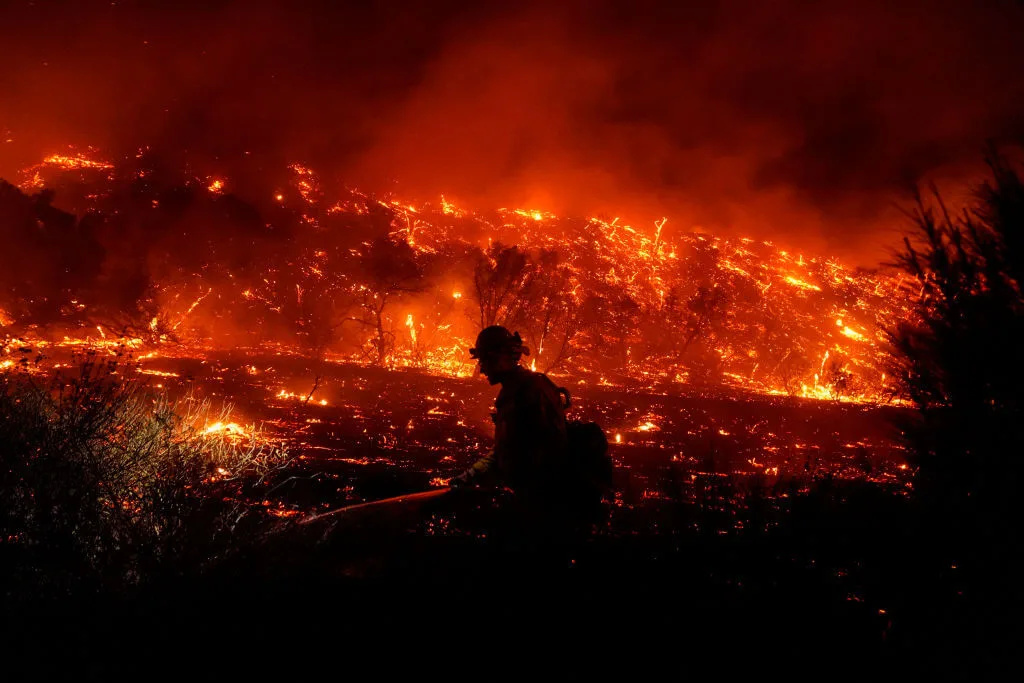
A recent study found that people making $109,000 and higher must adjust their carbon-emitting habits by a factor of 30 in order to stave off the most disastrous effects of climate change. (Kent Nishimura / Los Angeles Times via Getty Images)
Unless people making $109,000 and more drastically change their collective habits, the world will be unable to prevent the most dire consequences of climate change.
The world’s richest people are effectively dooming any efforts to avoid the most devastating consequences of climate change, according to a new report published Wednesday by the United Nations Environment Program.
The wealthiest 1% of the world’s population—whom the report defines as incomes of more than $109,000 per year—currently account for more than double the greenhouse gas emissions of the poorest 50%, according to the organization’s annual Emissions Gap Report.
The report, which surveys the difference between where the world’s greenhouse gas emissions are projected to be in 2030 and where they should be to avoid the worst impacts of a warming planet, found that nations are “absolutely not” close in their efforts to bridge that gap and adequately reduce emissions—the key driver of climate change.
Unless the top 1% dramatically alter their lifestyles and reduce their current carbon emissions by at least a factor of 30, the world will fail to meet the targets set by the 2016 Paris Climate agreement, the report found. The Paris Accord is an international compact that seeks to keep the global temperature rise this century “well below” 2 degrees Celsius above pre-industrial levels and ideally, to only 1.5 degrees Celsius above those levels.
Despite those ambitions, global greenhouse gas emissions have risen about 1.4% annually on average since 2010 and emissions hit a new high in 2019. While the pandemic-linked economic slowdown and resulting drop in travel is expected to cause a drop of about 7% in carbon dioxide emissions this year, that decrease will have a “negligible long-term impact” long-term impact on slowing down climate change, according to the report.
Consequently, the world is still hurtling towards a temperature rise in excess of 3 degrees celsius this century, which could have catastrophic consequences.
“#COVID19 has been bad but there is hope at the end of the tunnel with a vaccine. There is no vaccine for the planet,” Inger Andersen, executive director of the U.N. Environment Program, tweeted on Wednesday. “We need profound shifts in how we live, travel, eat and generate electricity: for ourselves, our societies & economies.”
To reach the agreement’s stated goal, countries will need to “roughly triple” their current emissions-cutting pledges. To meet the more ambitious goal of limiting warming to 1.5 degrees Celsius, nations would have to increase their targets at least fivefold. That would include profound and controversial steps to transform societies and their consumption: decreasing air travel, embracing electric vehicles and renewable energy, reshaping public planning around walking and public transit, investing in green infrastructure, and reducing meat consumption.
Such changes would disproportionately affect the wealthy, who travel more via cars and airplanes, live in large homes that require more energy, and spend more on carbon-intensive products, such as clothing and furniture. Americans are also among those most responsible for emissions, as the carbon footprint of the average American is more than twice the footprint of a person living in the European Union or the United Kingdom, and almost 10 times that of the average Indian citizen.
Making such robust changes will be difficult in the US, however, given the Republican Party’s decades-long climate science denial and the nation’s growing inequality. Research indicates that countries with high levels of inequality—like the US—make those same nations less able to tackle climate change. When resources and wealth are concentrated at the top, the elite are insulated from the worst impacts of climate change and thus have less incentive to support meaningful climate measures. In contrast, those on the lower end of the wealth spectrum find themselves most vulnerable to the dire consequences of climate change.
The grim findings of the U.N. report come after a year in which the consequences of the climate crisis became visceral and impossible to ignore. 2020 is on track to be one of the warmest years on record and was marked by devastating wildfires across the West, extreme heat waves in places like Arizona, and a busy hurricane season in the Southeast. A report released Tuesday by the National Oceanic and Atmospheric Administration also found that the Arctic as a whole is warming at nearly three times the rate of the rest of the world.
“To put it simply, the state of the planet is broken,” U.N. Secretary General António Guterres said in a speech last week at Columbia University. He urged world leaders to act with more urgency, noting the danger of “apocalyptic” fires and floods.
“Humanity is waging war on nature. This is suicidal,” Guterres warned. “Nature always strikes back, and it is already doing so with growing force and fury.”
In a video posted on Twitter on Wednesday, Guterres laid out the steps needed to reverse the trend.
“We have an opportunity. A sustainable pandemic recovery that priorities climate action can protect human health, jobs and economies, and limit global warming,” he said. “We need to put a price on carbon. We need renewable energy and green jobs. No more fossil fuel subsidies or new coal-fired power plants. More support for fossil fuel-dependent countries to diversify their economies and solutions that nurture and restore nature. I urge all nations, particularly the G20, to heed this call and protect people, prosperity, and the planet we depend on.”
Guterres said he was encouraged by the growing number of pledges from countries to reach carbon neutrality and net-zero emissions by mid-century, but said those promises needed to be turned into concrete plans with real action and investment. The US is likely to join the list of more than 100 nations who have adopted or are considering such a pledge under the incoming Biden-Harris administration.
President-elect Biden has vowed to address climate change with an ambitious $2 trillion plan to reach net-zero carbon emissions by 2035, all while creating millions of new jobs by increasing the use of clean energy in the transportation, electricity, housing, and building sector.
That sort of proposal is exactly what the report’s authors say is needed. They found that if governments around the world invest heavily in renewable energy as part of their post-coronavirus stimulus efforts, the world could trim as much as 25% from its predicted 2030 emissions.
How much would they have to spend exactly? Just a fraction of what they’ve already pledged to address the pandemic’s economic impacts. As of October, governments across the world had spent at least $12 trillion on coronavirus stimulus spending this year.
A recent study, published in the journal Science, found that if governments spent just 12% of that total each year through 2024 on low-carbon energy investments and efforts to reduce our dependence on fossil fuels, that would be enough to limit global warming to 1.5 degrees Celsius, in line with the Paris Agreement’s most ambitious goal.

He said what? 10 things to know about RFK Jr.
The Kennedy family has long been considered “Democratic royalty.” But Robert F. Kennedy, Jr.—son of Robert F. Kennedy, who was assassinated while...

Here’s everything you need to know about this month’s Mercury retrograde
Does everything in your life feel a little more chaotic than usual? Or do you feel like misunderstandings are cropping up more frequently than they...

Arizona expects to be back at the center of election attacks. Its officials are going on offense
Republican Richer and Democrat Fontes are taking more aggressive steps than ever to rebuild trust with voters, knock down disinformation, and...

George Santos’ former treasurer running attack ads in Arizona with Dem-sounding PAC name
An unregistered, Republican-run political action committee from Texas with a deceptively Democratic name and ties to disgraced US Rep. George Santos...




